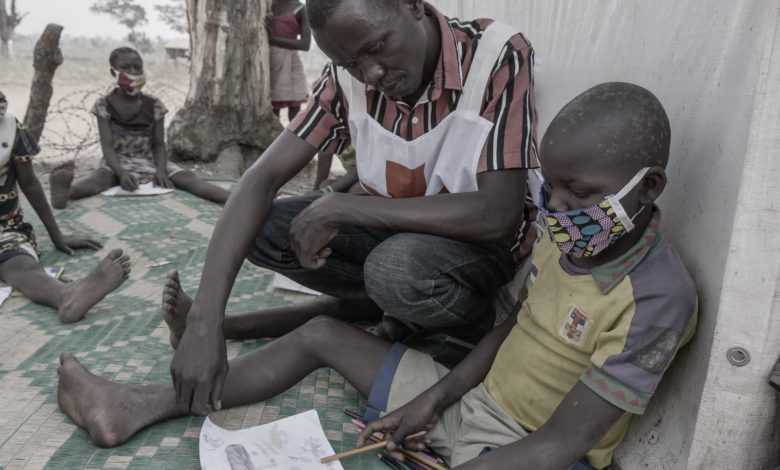Children In Central African Republic Face Trauma Amidst Ongoing Violence
The International Committee of the Red Cross said children in Central African Republic, CAR, are in need of mental healthcare.

Children in the Central African Republic (CAR) are in urgent need of psychological help after experiencing various forms of violence, according to the International Committee of the Red Cross (ICRC).
The violence in CAR, which began in Dec. 2020, has so far displaced over 180,000 people who fled in a desperate search for safety.
The clashes involve armed groups, rebels of the Coalition of Patriots for Change (CPC) and government forces.
Psychiatric health services are non-existent in the country, with only one practising psychiatrist in the entire population, and a vastly underfunded health system, which will in no way suffice to attend to those requiring immediate psychiatric attention.
Bloodshed, rape and other ruthless acts of violence have been the tales from the men, women and children who have experienced the traumatising ordeals. Many of the children have lost their homes and loved ones to the violence.
Thirteen-year-old Fabrice watched his brother being killed by the rebels.
“They shot at my brother. He fell. He lay dying on the ground. It hurts when I think of him. I sleep very badly. I have lots of nightmares,” he told the ICRC.
Karine, who is 10, has been distraught since she lost her mother and her family fled their home, saying that the organisation’s therapy helped her deal with what she felt after the ordeal she went through.
“I went to see the people from the Red Cross, and they comforted me. I don’t have nightmares anymore. I can have fun with the other children,” she said.
Romaric Debas, a Red Cross volunteer, said the most common emotions in the children are “fear, sadness and anger.”
“Some children are really sad, and some even refuse to speak,” Debas added.
The organisation reported that most parents resort to traditional healers and shamans to treat psychological issues.
“Parents turn to these practitioners when their child suffers from nightmares or from images they cannot shake off, when deep depression makes them avoid their friends, or when they faint for reasons their families cannot understand,” ICRC said in its report.
ICRC’s mental health specialists have engaged traditional healers and parents since 2014 in the Kaga-Bandoro region of CAR in efforts to convince them in engaging modern treatment methods alongside traditional treatment.
Healers have now begun to take children to the ICRC on their own.
Progress so far
Over 550 children from three different IDP camps underwent therapy in 2020 in Kaga-Bandoro.
Kago-Bandoro was one of the significant regions that suffered from unrest between 2016 and 2018, with minimal essential services and government presence.
The most recent attack on the town occurred in December, leaving scores of fatalities, with many houses razed and over 4,300 people having to seek refuge elsewhere.
“Psychological support is provided once a week in the camps for displaced persons, with the aid of Central African Red Cross volunteers, either in groups or with individual children.”
“Therapists use stories, drawing, breathing exercises or simply the spoken word during individual sessions at Kaga-Bandoro Hospital,” the organisation said.
The ICRC President, Peter Maurer, who was in Kaga-Bandoro recently, said that he was glad to see that the organisation had begun to pay attention not just to the physical aspect of war, but the mental, “invisible” side of it as well.
“When we started thinking about a more holistic approach to health problems, we began talking about psychological problems, the kinds of mental health problems that people are exposed to during war.”
“I am very encouraged to see that the first programmes are now underway. Because it’s true that in the past, we perhaps paid too much attention to the physical aspect,” he said.
The organisation also expressed hope in seeing the CAR government engage in providing mental healthcare in the uture as soon as the country’s situation becomes stable, to enable the country’s population to heal and overcome their psychological traumas.
Support Our Journalism
There are millions of ordinary people affected by conflict in Africa whose stories are missing in the mainstream media. HumAngle is determined to tell those challenging and under-reported stories, hoping that the people impacted by these conflicts will find the safety and security they deserve.
To ensure that we continue to provide public service coverage, we have a small favour to ask you. We want you to be part of our journalistic endeavour by contributing a token to us.
Your donation will further promote a robust, free, and independent media.
Donate HereStay Closer To The Stories That Matter




